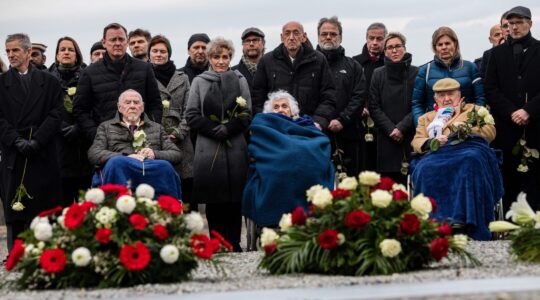BOSTON (JTA) – In the wake of the recent disclosure by the author of a Holocaust memoir that her best-selling book is a fake, historians are worried that such incidents will cast doubt on legitimate Holocaust scholarship and memoirs.
Holocaust deniers already are having a field day with the story, observers say.
A prominent article about the hoax is featured on the Web site of Holocaust denier David Duke, who asserts that the case casts doubt on all “outlandish Holocaust tales.”
Deborah Dwork, a Holocaust scholar who says she warned the publisher of the book, “Misha: A Memoir of the Holocaust Years,” a decade ago that the book’s veracity was suspect, is most concerned about how young minds will be affected by such fakery.
The effect on young people, “who are not grounded in history and who may only vaguely remember talk that a memoir was not true,” she said, “opens the door to greater readiness to acceptance of Holocaust denier arguments.”
Dwork is the director of the Strassler Family Center for Holocaust and Genocide Studies at Clark University in Worcester, Mass.
Lawyers for the Belgian-born Massachusetts author known as Misha Defonseca issued a statement last week saying the book was not true, that the author isn’t Jewish and that her real name actually is Monique De Wael.
De Wael, however, defended her work.
“This story is mine. It is not actually reality, but my reality, my way of surviving,” she said in the statement apologizing for the fabrication.
In the memoir, the author wrote that she lived with a pack of wolves after the Nazis abducted her parents, searched for her parents across Europe for four years as a young girl and murdered a German soldier.
She also claimed her parents were Belgian resistance fighters killed by the Nazis.
Boston Globe writer David Mehegan questioned the book’s legitimacy a decade ago.
Translated into 18 languages “Misha” was made into a popular film now playing throughout Europe. The film, by French filmmaker Vera Belmont, is called “Survivre Avec Le Loups” – “Surviving with Wolves.”
Deborah Lipstadt, a historian and expert on Holocaust denial, compared the incident to that of Binjamin Wilkomirski, whose popular Holocaust memoir “Fragments” was similarly discredited.
In the case of “Misha,” De Wael and her ghostwriter, Vera Lee, filed a lawsuit several years ago against the book’s publisher, Jane Daniel, for insufficiently promoting the book in the U.S. market.
In 2001, the pair won an enormous judgment against Daniel when a judge tripled a jury’s damages and awarded the two more than $30 million.
As the complicated story surrounding the book unraveled last week, the Belgian newspaper Le Soir reported that not only were De Wael’s parents not killed by the Nazis, but they actually collaborated with them.
Relatives of De Wael’s father, Robert, told Le Soir that Robert De Wael was responsible for denouncing a number of fellow townspeople to the Gestapo. He was not killed by the Nazis, relatives said, but died of natural causes after the war.
When townspeople learned about this after the war, Robert De Wael’s name was removed from a Brussels monument to those who had died at the hands of the Nazis.
JTA has documented Jewish history in real-time for over a century. Keep our journalism strong by joining us in supporting independent, award-winning reporting.





